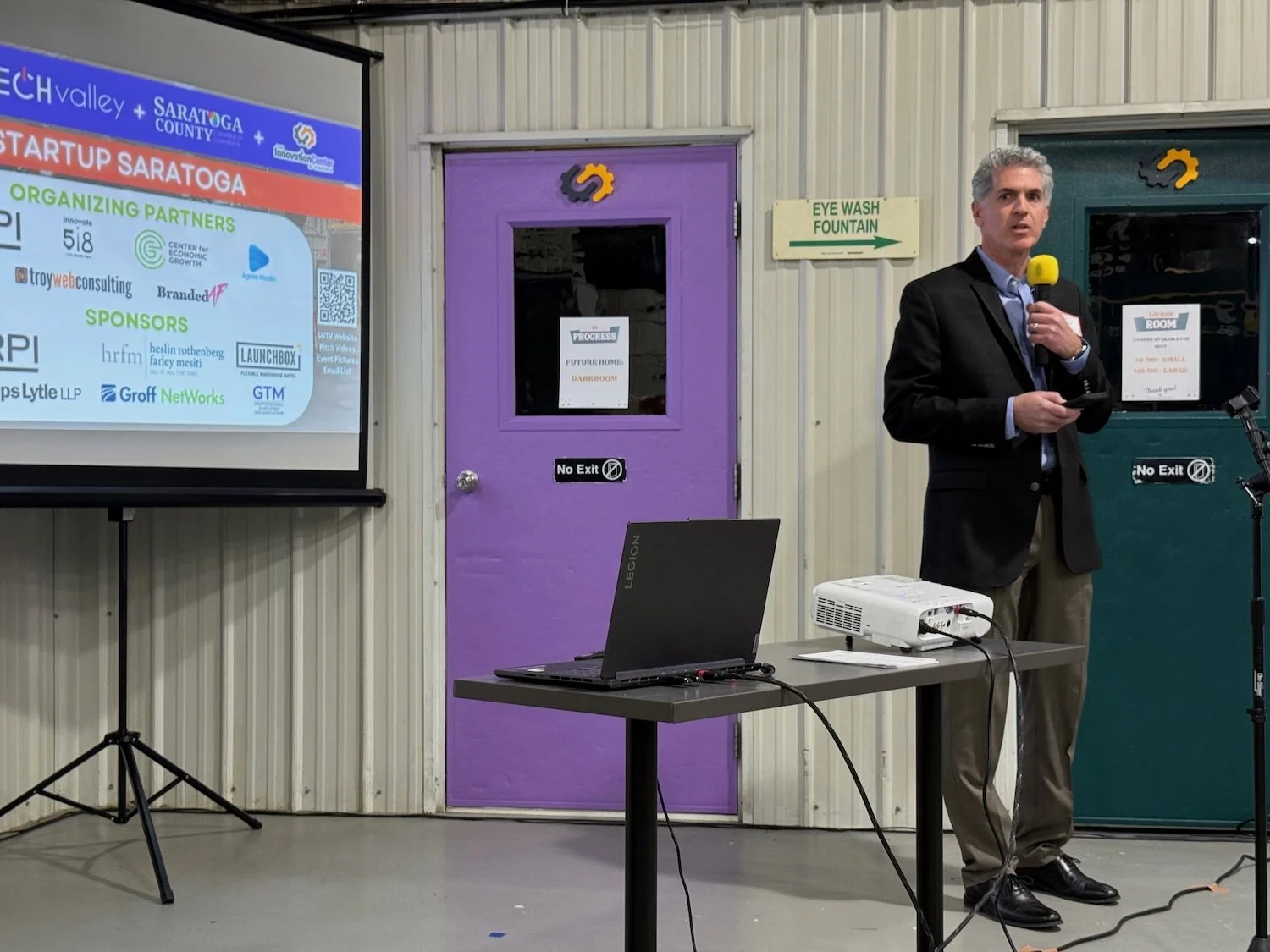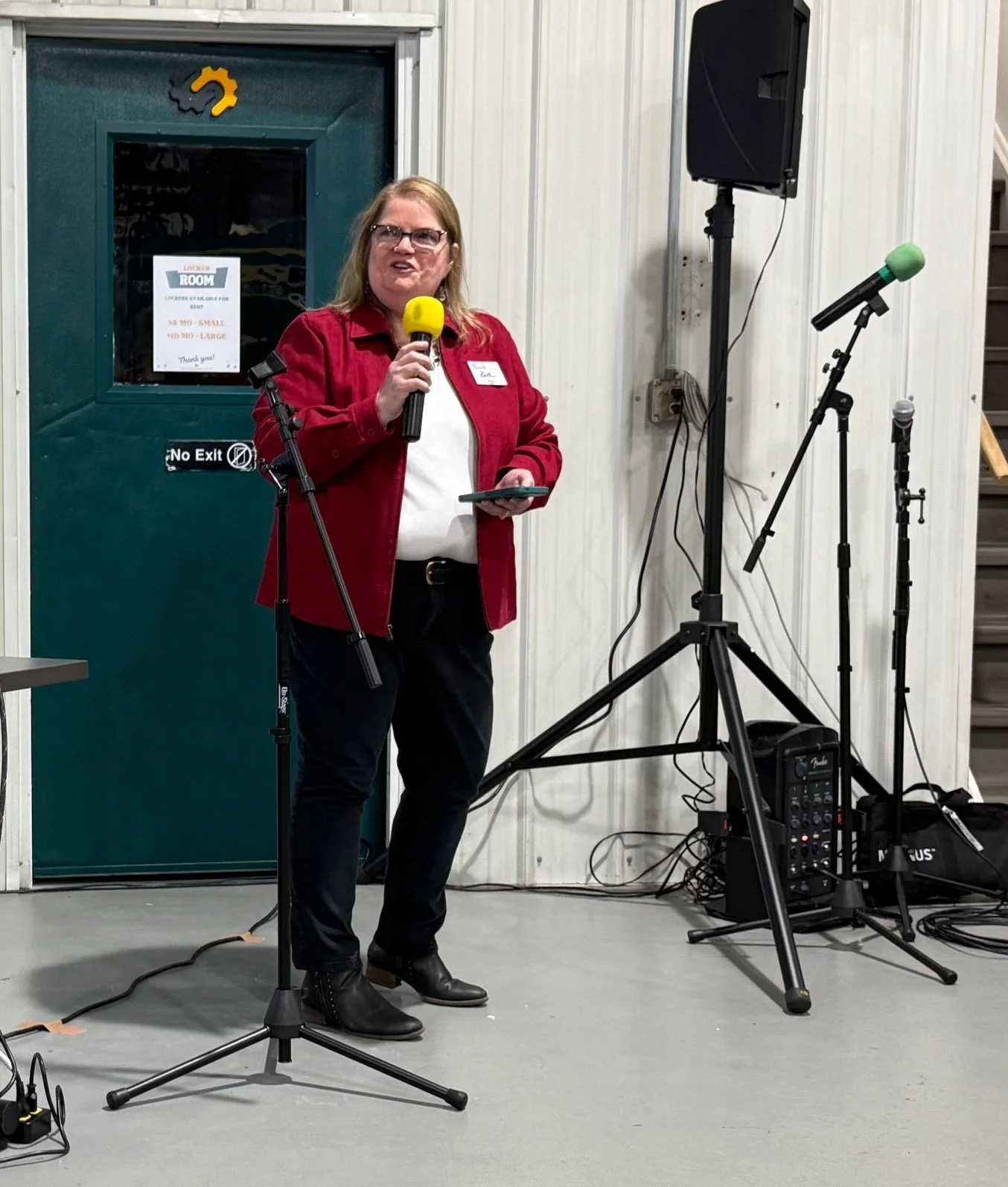A New Post-Covid Buzz at Startup Saratoga
By Dan Forbush with Smartacus
A Record Gathering for a Resurgent Ecosystem
RPI’s Eric Ledet is reviving Startup Tech Valley with a focus on investor-ready companies.
On a crisp November evening, the Innovation Center at Saratoga buzzed with an energy that felt both new and deeply rooted. The joint event hosted by RPI’s Startup Tech Valley and the Saratoga County Chamber of Commerce was more than just another networking mixer; it was a powerful demonstration of a regional innovation ecosystem in a state of concerted acceleration.
In a region with a rich history of technological leadership—a legacy shaped by titans like George Low and Mike Wachholder—the evening felt like a conscious continuation of that tradition.
The “record post covid registration," noted by organizer Eric Ledet, was a clear signal of renewed momentum.. Against the backdrop of 3D printers, laser cutters, and collaborative workspaces, entrepreneurs, investors, and community builders gathered to witness the tangible results of that ambition.
A Welcome from the
Heart of the Maker Community
Beth Muller is ecstatic in the Saratoga Innovation Center’s new home, which opened in June.
An entrepreneurial ecosystem is only as strong as its physical and social infrastructure. It requires a central hub where ideas can be prototyped, skills can be learned, and connections can be forged. In her welcoming address, Beth Muller, Founder and Board President of the Saratoga Innovation Center, made it clear that the center is designed to be precisely that—a critical piece of community infrastructure where creativity is given the tools to become commerce.
Muller provided an overview of the center's deliberately eclectic arsenal of resources, which cater to a wide spectrum of creators. The significance of blending state-of-the-art digital fabrication with traditional crafts cannot be overstated; it signals a broad, inclusive definition of innovation that supports both high-tech startups and Main Street businesses, making the entire ecosystem more resilient. Key resources available to the community include:
Digital & Advanced Fabrication: A suite of modern tools including multiple 3D printers, a CNC router for precision cutting, and a laser cutter.
Creative & Traditional Crafts: Fully equipped spaces for woodworking and weaving, demonstrating a commitment to both high-tech and hands-on creation.
Knowledge & Skills: A computer lab offering classes on practical software like Affinity Publisher, with a darkroom and photography studio forthcoming to support visual arts.
Beyond providing tools, the center is actively fostering the next generation of businesses through its "Entrepreneurship is Everyone's Business" program. This year-long initiative is designed to support startups, early-stage ventures, Main Street businesses, and artisans. Its comprehensive structure provides participants with dedicated mentorship, opportunities to pitch their ideas, and a vital peer support group to navigate the challenges of building a business. By creating this space for innovation, the center provides the physical foundation upon which the region's human network can thrive.
The Vision:
Curating Excellence for the Capital Region
The success of any startup ecosystem showcase hinges on the quality of the ventures it presents. In his opening remarks, organizer Eric Ledet affirmed that this principle is at the core of the organizers' mission. He emphasized their focused effort to "curate the startups that come through" and "elevate the level" of talent on display. The ultimate goal, he explained, is to make every Startup Tech Valley event a "compelling" and undeniable showcase of the Capital Region's entrepreneurial strength.
This vision is made possible by a robust coalition of sponsors who serve as the modern-day architects building the scaffolding for this generation's innovation. They are not merely funders but active partners providing the essential support system for emerging companies.
Intellectual Property & Legal Foundation: Emily Frazier of Heston Rothenberg, Farley, Mercedes (HRFM), the largest and oldest full-service IP firm in upstate New York, described their role in helping innovators protect their ideas. By offering the full gamut of services for clients ranging from independent inventors to Fortune 500 companies, HRFM provides the essential legal framework that allows ideas to become assets. This legal foundation is non-negotiable; it transforms raw ideas into defensible, investable assets, which is the first gate every serious startup must pass.
HR, Payroll & Compliance: GTM Payroll and HR detailed how its Professional Employer Organization (PEO) model provides a critical service for growing companies. By enabling small employers to access large-group health and retirement benefits, GTM helps startups "attract and keep employees without extra overhead." By solving the HR and benefits puzzle, PEOs like GTM allow founders to compete for top talent with larger corporations, leveling a critical playing field.
Community and Mentorship: The presence of sponsors like Phyllis Lyle, Drop Networks, and LaunchBox underscored the deep-seated culture of mentorship and peer support in the region. These organizations and individuals represent the vital framework of guidance and resources that are indispensable for long-term success.
With this strong foundation of support firmly in place, the evening's focus shifted to the new pathways being created to ensure a steady pipeline of opportunity for the next wave of entrepreneurs.
Building the Pipeline:
Fostering a Culture of Opportunity
What followed was not merely a series of announcements, but a clear illustration of the ecosystem's leaders deliberately constructing an "on-ramp" for aspiring founders. These initiatives are designed to lower the barrier to entry, de-risk the entrepreneurial journey, and ensure that talent and ideas, regardless of their origin, have a clear path to high-value resources.
Academic Partnership (RPI): Kevin Fletcher of RPI's Lally School of Management extended a remarkable offer to the community: free student consulting projects. He invited companies to submit proposals for strategy development or market research, promising between 200 and 400 hours of dedicated work from talented MBA and undergraduate students. This initiative provides immense value to resource-strapped startups while giving students invaluable real-world experience.
Venture Readiness (CEG): John Taylor from the Center for Economic Growth (CEG) introduced the "Venture Readiness Program." This free program is designed specifically to prepare entrepreneurs for the rigors of raising venture capital. Participants are paired with experienced Entrepreneurs in Residence for months of mentorship, culminating in being ready to pitch for funding.
Global Context (Global Entrepreneurship Week): Richard Wynne, a dedicated ecosystem builder, placed the evening's gathering in a powerful global perspective. He noted that the event was part of Global Entrepreneurship Week, a worldwide celebration involving 10 million people across 200 countries. His closing remark captured the spirit of the night perfectly: "all of us here tonight, we are building the future of entrepreneurship in the capital region."
This framework of support, partnership, and global connection set the perfect stage for the main event: the startup pitches, which served as living proof of the ecosystem's vibrant output.
The Pitches:
Four Visions for a Smarter Future
The centerpiece of the evening was the showcase of four distinct companies, each the direct inheritor of the region's legacy of ambition, tackling 21st-century problems with compelling technological solutions. These pitches embodied the meticulously curated talent that Startup Tech Valley aims to spotlight, representing the innovative engine of the Capital Region at its best.
ReWire Energy: Automating Energy Efficiency and Incentive Capture
Rewire’s Alan Evans pitched Zeos AI, a new platform that turns a complex defensive chore into a proactive financial opportunity.
Alan Evans of ReWire defined a "triple threat" facing building owners in the Northeast: skyrocketing energy costs, massive compliance penalties from new decarbonization laws like NYC's Local Law 97, and significant resource gaps in time and expertise. He pointed out that of the $2 billion in available energy incentives in the region, only 25% are ever utilized due to complexity. ReWire's solution, Zeos AI, turns this complex, defensive chore into a proactive financial opportunity. The platform automates the entire process, offering a real-time energy dashboard, automated compliance filing, and a proprietary engine that matches projects with all available incentives, capturing savings and transforming a regulatory burden into a strategic advantage.
RevOps HQ: Architecting the Engine of Modern Revenue
Paul Maxwell of RevOps HQ tackled the chaotic and costly failure point of modern business: the broken promise of CRM. He identified the common pitfalls—over-investing in brittle homegrown systems, getting stuck with limited niche CRMs, or creating a "rat's nest" of disconnected tools. RevOps HQ positions itself as the antidote. As a HubSpot solutions partner, the company doesn't just sell software; it architects and implements a company's entire revenue operations strategy. By designing the fundamental data models, mapping business processes, and building the necessary automations, RevOps HQ creates a unified, single-pane-of-glass system that aligns marketing, sales, and customer success into a cohesive and efficient revenue engine.
Polymathic Innovations: Democratizing Wind Power for Home Resilience
At Polymathic Innovations, Jeff Osborne is tackling the growing fragility of the power grid.
Jeff Osborne, founder of Polymathic Innovations, tackled the growing fragility of the power grid. He argued that even the popular combination of solar panels and home batteries cannot guarantee continuous power, as solar is often unavailable during the most severe grid events like storms or consecutive cloudy days. The solution is the Gridleaf wind turbine, a modular micro-turbine designed to create usable power from low-elevation winds. Featuring proprietary "wind boost panels," Gridleaf supplements solar power by generating energy during the night and in poor weather, ensuring a home's battery stays charged. This provides homeowners with true 24/7 energy independence and resilience against grid outages.
Conquiro: Creating a Digital Twin to Safeguard Hospital Assets and Patients
Michael Warner of Conquiro began with a harrowing personal story from his co-founder, whose son nearly died and was left permanently injured after clinicians wasted 30 critical minutes searching for a simple cast saw. This anecdote powerfully framed the multi-billion-dollar problem Conquiro solves: lost equipment, which leads to clinician burnout, patient harm, and massive financial waste. The problem is quantifiable and staggering, with nurses spending up to 72 minutes per shift looking for equipment. Conquiro's solution is a "digital twin" of a hospital, powered by RFID tags and base stations that create an autonomous, real-time tracking system—a "Google Maps for finding technology"—allowing staff to instantly locate any device, preventing dangerous delays and saving hospitals millions.
Conclusion: A Resilient Ecosystem on the Rise
The Startup Tech Valley event was more than a showcase; it was a definitive statement. The record-setting attendance, the vibrant hub provided by the Saratoga Innovation Center, the deeply integrated network of legal, financial, and community sponsors, and the pipeline of high-caliber startups all point to an ecosystem that is not just recovering, but thriving. The evening demonstrated a clear, strategic effort to connect every part of the entrepreneurial journey, from providing the tools for an initial prototype to preparing a founder for a venture capital pitch. The spirit of innovation championed by regional pioneers like George Low and Mike Wachholder is not a relic of the past. That spirit is not merely alive; it is being forged anew, purposefully and collaboratively, by the modern architects of the Capital Region's next technological chapter.




